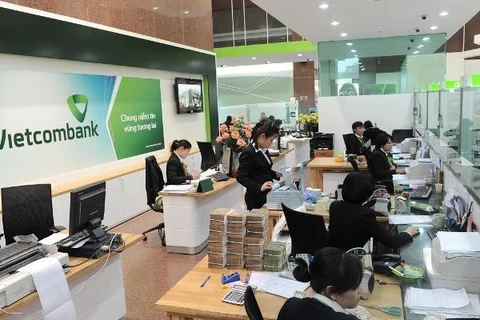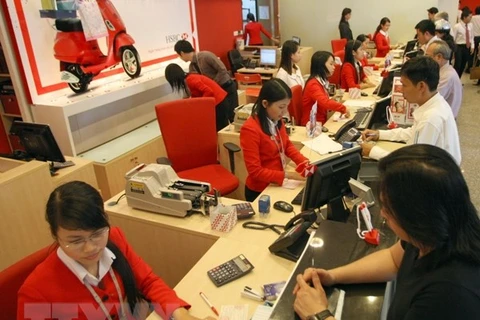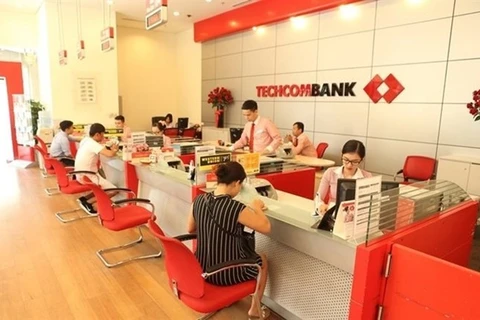Hanoi (VNS/VNA) - Banks and insurance companies are ramping up cooperation in selling life insurance products (bancassurance) to cash in on the high growth segment as some have posted annual triple-digit growth rates in the business.
After successful partnerships with VPBank, CitiBank, ACB and SeABank, insurer AIA Vietnam this year continued to cooperate with Kien Long Commercial Joint Stock Bank (Kienlongbank) to strengthen bancassurance exploitation.
Under a strategic cooperation agreement signed recently, Kienlongbank and AIA will jointly offer comprehensive financial solutions on saving, protection, investment and healthcare through 134 branches and transaction offices of Kienlongbank across the country, especially in the southern provinces.
Ng Keng Hooi, President and CEO of AIA Group, told the media that along with the distribution channel through agents, the bancassurance channel will be part of AIA’s strategy in 2019.
VPBank has also chosen bancassurance development as one of its strategic focuses in 2019.
Bancassurance has also seen high growth in many other banks and insurers. One typical case is the cooperation between Manulife and Saigon Commercial Joint Stock Bank (SCB). After three years of exclusive partnership, the premium revenue of the businesses has increased by more than 100 percent compared to the plan.
Similarly, the bancassurance business results of Prudential and Vietnam International Commercial Joint Stock Bank (VIB) in the past three years also rose sharply. The number of new life insurance contracts of VIB in 2018 soared by over 200 percent compared to 2017 and over 260 percent compared to 2016. Particularly, the PRU Flexible investment product, which not only provides financial protection but also offers customers flexibility in choosing investment funds to increase asset accumulation, attracted tens of thousands of contracts in the first ten months of last year.
Many other banks also attained hundreds of billions of Vietnamese dong from long-term exclusive contracts with insurance partners, such as Vietnam Technological and Commercial Joint Stock Bank (Techcombank) with a 15-year exclusive contract with Manulife, Saigon Hanoi Commercial Joint Stock Bank (SHB) with a 15-year strategic cooperation with Dai-ichi Vietnam, Saigon Thuong Tin Commercial Joint Stock Bank (Sacombank) with a strategy to cooperate with Dai-ichi to distribute insurance products on a very long term of 20 years.
Data of the Vietnam Insurance Association showed that some 8 percent of Vietnam’s population currently has life insurance contracts. Though there is no updated data, the number of insurance contracts signed via bancassurance in the first half of last year grew by 89 percent year-on-year, reaching nearly 857,000 contracts.
Notably, the number of newly exploited contracts via bancassurance in the period increased by 180 percent year-on-year while the new premium revenue of this channel accounted for 17.8 percent of the total newly exploited revenue of the entire market.
Upbeat outlook
According to banking expert Nguyen Tri Hieu, the bancassurance channel has high growth potential, given by the rising number of middle and high income earners and better awareness on insurance of local people.
“It is very useful for banks and insurers to develop the bancassurance model as it is an effective distribution channel. It helps both banks and insurers not only expand the business scale and increase customer access but also limit risks for them,” Hieu told Viet Nam News.
“By taking advantage of the widespread network of banks, insurance companies can access the huge source of data of banks that the bancassurance channel offers. In turn, by cooperating with insurance companies, the list of products and services provided to banks’ customers increases without the need to raise investment capital while the sale of insurance products sold along with lending also help banks reduce the risk of capital loss,” Hieu explained.
AIA’s Hooi also highly appreciated the potential of the bancassurance channel as Vietnam’s population will reach 100 million people and gross domestic product growth will rise.
Swiss Re insurance group also estimated the potential to exploit life insurance products in Vietnam reaches up to $700 billion, based on the current expected death rate.
In addition, like other Asian developing markets, Vietnam has other advantageous factors to further develop the bancassurance channel, such as a high GDP growth, a rising number of middle income earners and a low ratio of insurance revenue via banks of 6 percent compared with 70 percent around the world. — VNS/VNA
After successful partnerships with VPBank, CitiBank, ACB and SeABank, insurer AIA Vietnam this year continued to cooperate with Kien Long Commercial Joint Stock Bank (Kienlongbank) to strengthen bancassurance exploitation.
Under a strategic cooperation agreement signed recently, Kienlongbank and AIA will jointly offer comprehensive financial solutions on saving, protection, investment and healthcare through 134 branches and transaction offices of Kienlongbank across the country, especially in the southern provinces.
Ng Keng Hooi, President and CEO of AIA Group, told the media that along with the distribution channel through agents, the bancassurance channel will be part of AIA’s strategy in 2019.
VPBank has also chosen bancassurance development as one of its strategic focuses in 2019.
Bancassurance has also seen high growth in many other banks and insurers. One typical case is the cooperation between Manulife and Saigon Commercial Joint Stock Bank (SCB). After three years of exclusive partnership, the premium revenue of the businesses has increased by more than 100 percent compared to the plan.
Similarly, the bancassurance business results of Prudential and Vietnam International Commercial Joint Stock Bank (VIB) in the past three years also rose sharply. The number of new life insurance contracts of VIB in 2018 soared by over 200 percent compared to 2017 and over 260 percent compared to 2016. Particularly, the PRU Flexible investment product, which not only provides financial protection but also offers customers flexibility in choosing investment funds to increase asset accumulation, attracted tens of thousands of contracts in the first ten months of last year.
Many other banks also attained hundreds of billions of Vietnamese dong from long-term exclusive contracts with insurance partners, such as Vietnam Technological and Commercial Joint Stock Bank (Techcombank) with a 15-year exclusive contract with Manulife, Saigon Hanoi Commercial Joint Stock Bank (SHB) with a 15-year strategic cooperation with Dai-ichi Vietnam, Saigon Thuong Tin Commercial Joint Stock Bank (Sacombank) with a strategy to cooperate with Dai-ichi to distribute insurance products on a very long term of 20 years.
Data of the Vietnam Insurance Association showed that some 8 percent of Vietnam’s population currently has life insurance contracts. Though there is no updated data, the number of insurance contracts signed via bancassurance in the first half of last year grew by 89 percent year-on-year, reaching nearly 857,000 contracts.
Notably, the number of newly exploited contracts via bancassurance in the period increased by 180 percent year-on-year while the new premium revenue of this channel accounted for 17.8 percent of the total newly exploited revenue of the entire market.
Upbeat outlook
According to banking expert Nguyen Tri Hieu, the bancassurance channel has high growth potential, given by the rising number of middle and high income earners and better awareness on insurance of local people.
“It is very useful for banks and insurers to develop the bancassurance model as it is an effective distribution channel. It helps both banks and insurers not only expand the business scale and increase customer access but also limit risks for them,” Hieu told Viet Nam News.
“By taking advantage of the widespread network of banks, insurance companies can access the huge source of data of banks that the bancassurance channel offers. In turn, by cooperating with insurance companies, the list of products and services provided to banks’ customers increases without the need to raise investment capital while the sale of insurance products sold along with lending also help banks reduce the risk of capital loss,” Hieu explained.
AIA’s Hooi also highly appreciated the potential of the bancassurance channel as Vietnam’s population will reach 100 million people and gross domestic product growth will rise.
Swiss Re insurance group also estimated the potential to exploit life insurance products in Vietnam reaches up to $700 billion, based on the current expected death rate.
In addition, like other Asian developing markets, Vietnam has other advantageous factors to further develop the bancassurance channel, such as a high GDP growth, a rising number of middle income earners and a low ratio of insurance revenue via banks of 6 percent compared with 70 percent around the world. — VNS/VNA
VNA

























